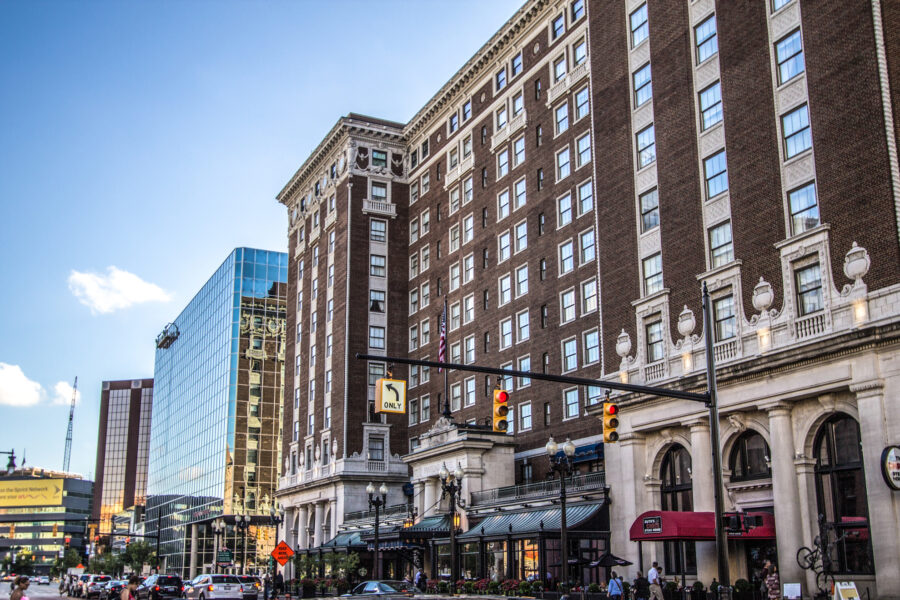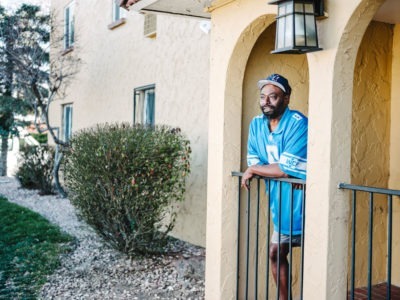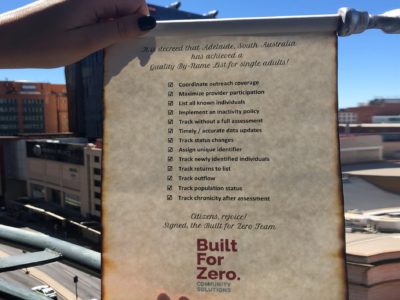Since the start, Kent County’s work with Built for Zero has been closely tied to their local business community.
In fact, it was leaders of the Grand Rapids Area Chamber of Commerce who encouraged and sponsored Kent County’s enrollment into the Built for Zero Collaborative in May 2021.
Kent County has since continued to strengthen its homeless response system through strategic investments and purposeful collaboration with their business community, which includes the Chamber of Commerce, the City of Grand Rapids, and local philanthropic organizations.
“Cross-sector coordination has been a huge win for our community. It seems like it’s really easy to do, but it has to be really intentional,” said Courtney Myers-Keaton, the Continuum of Care Director at the Grand Rapids Area Coalition to End Homelessness. “It’s about very intentional engagement and cultivating those relationships so that you can have these continued conversations.”
When the Covid-19 pandemic began, the community saw an increase in the visibility of homelessness on the street. More encampments appeared in the business district, where they had in the past not been seen. Local businesses began to understand the type of challenge the homeless response system faced.
“Historically, they would tend to lean towards calling Grand Rapids Police to address whatever issues they were experiencing,” Myers-Keaton explained. ”Instead, they came together as a business community and said, ‘What can we do? How can we help?’”
Endorsing systemic change
The Built for Zero team in Kent County began holding strategy sessions with business and philanthropic leaders to find ways to support the community’s efforts to reduce and end homelessness. These leaders sought to identify how the business community could be part of systemic change across the entire community, rather than only underwriting singular initiatives.
“They understand that the need is widespread and not limited to just downtown district areas,” Myers-Keaton said.
The Grand Rapids Community Foundation now leads regular meetings in which a group of around two dozen philanthropic organizations and charitable arms of local businesses gather to discuss ways they can provide support. As one of those organizations, the DeVos Family Foundations has spearheaded efforts to bring more business leaders on board in order to leverage resources that have yet to be tapped toward ending homelessness.
“They see this as part of a framework towards ending homelessness, and they want to be part of the solution.”
Courtney myers-keaton
“Everyone has an important role to play in this conversation,” said Pamela Parriott, Director of Philanthropy at the DeVos Family Foundations. “We want to collaborate broadly and think strategically to create an upstream solution that addresses the factors that cause individuals to lose housing in the first place.”
As business leaders began understanding Kent County’s aim to develop a system designed to reduce and end homelessness, they wanted to know how they could best support it.
“They’re having these conversations and [are] proactively involved in ways that we hadn’t really seen previously,” Myers-Keaton said.
For example, the Kent County team is currently in the middle of redesigning their Coordinated Entry process, moving toward a diversion/supportive solutions model in which designated staff members work with individual clients to help them develop a housing plan and ultimately reach stability.
“If they are determined to be in a housing crisis, they’re connected to somebody who walks alongside them until their crisis is resolved,” Myers-Keaton explained.
A more user-centered model such as this necessarily requires more staff, so the Kent County team is in conversations with their funders to identify what their system needs in order to support it.
“They see this as part of a framework towards ending homelessness, and they want to be part of the solution,” she said.
Partnering with the city during Covid-19
The power of connections across business, philanthropy, the homelessness system, and the city and county became evident as they worked together to keep people safe during Covid-19.
To help expand their local impact, the Kent County team partnered with the City of Grand Rapids, which has a designated homelessness liaison who is also a member of the local Built for Zero team. At the start of the pandemic when many homeless response agencies were pulling staff from the field, the City created a homeless outreach team to develop and spread messaging to people living in encampments about how to best safeguard against Covid-19 .
This outreach team was composed of firefighters, police officers, and social workers from one of the area’s largest mental health agencies. In addition to connecting with people experiencing homelessness, the outreach team also began to develop relationships with local businesses and share the City’s strategies for reducing homelessness.
“Private-public partnerships are responsible for our region’s greatest successes.”
Dan Meyering
“Private-public partnerships are responsible for our region’s greatest successes,” said Dan Meyering of Trillium Investments, one of the organizations that led the effort to join Built for Zero. “We are thankful for the opportunity to support better outcomes and stronger systems while increasing transparency and engagement within the business community.”
Serving as a model for other communities
Moving forward, Myers-Keaton hopes to continue to grow the homeless response system’s relationship with the broader business community, especially with their Chamber of Commerce. Local businesses rely on the Grand Rapids Chamber for leadership and to share ways they can support efforts to reduce homelessness.
“Where I see our partnership moving forward is communication and outreach about what we can do as a community to solve homelessness,” she said.
Joshua Lunger, Senior Director of Government Affairs for the Grand Rapids Chamber, also has high hopes for the road ahead.
“This collaboration will be transformational in supporting and informing needs along the entire housing spectrum,” he said. “We look forward to seeing this project through and will continue to engage and assist however we can in creating a more vibrant community for all.”
The Kent County team believes that their business community’s direct involvement and philanthropic support could serve as a model for other cities and counties.
“I would recommend that people start small,” Myers-Keaton explained. “And then as you’re building the support, bring everybody together to talk about the framework that we know works to solve homelessness and what their role can be in it.”
That role can take the form of financial contributions, communications support, or just generating awareness around the experience of homelessness. What’s key, Myers-Keaton noted, is ensuring the business community understands that these policies and initiatives are user-centered, putting people’s interests first, rather than profit.
“I think that will make some significant headway on how we solve homelessness together.”




